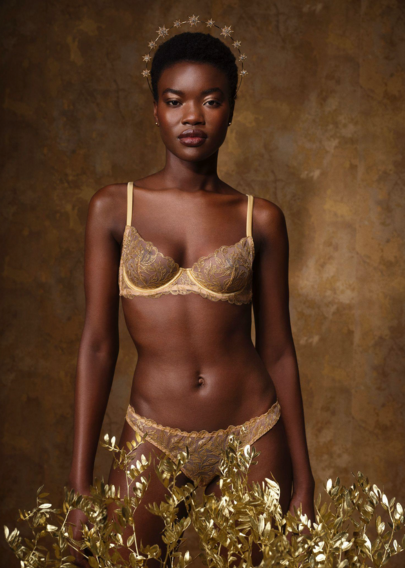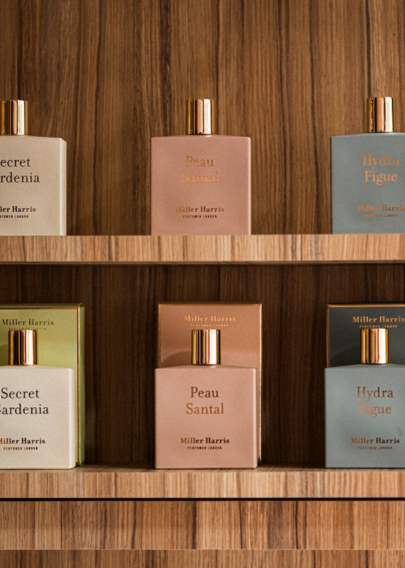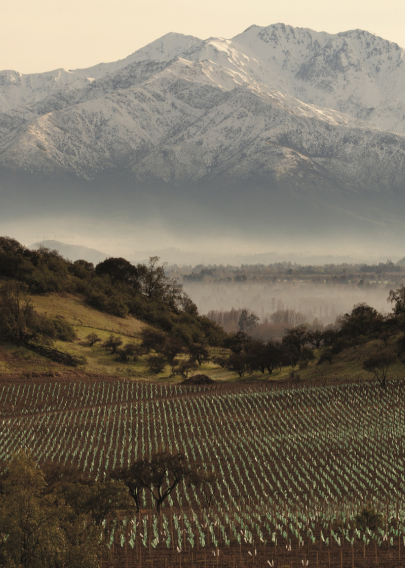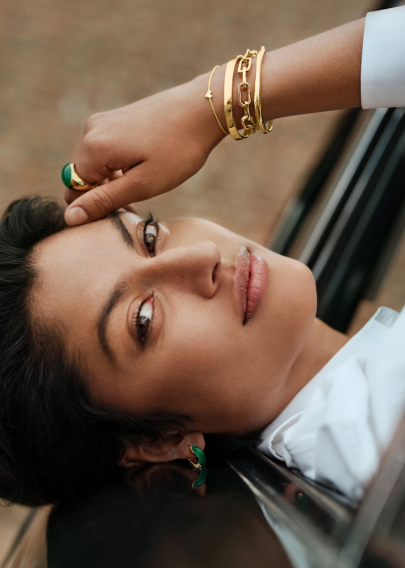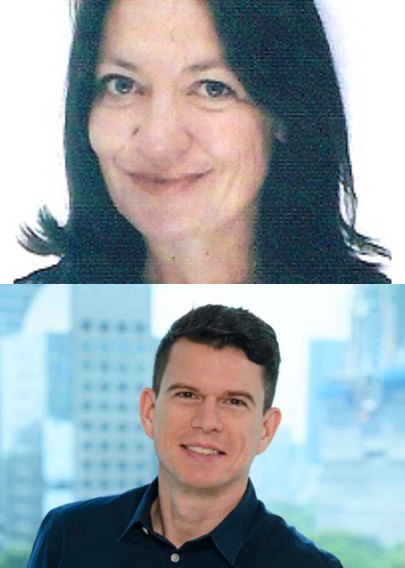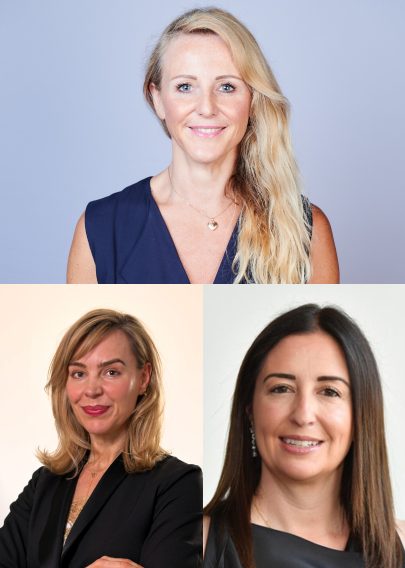Positive Luxury is proud to present the shortlisted brands for our very first Positive Luxury Awards ceremony happening on the 25th of February. Our judging panel of thought leaders and sustainability experts looked at a variety of brands, both within and outside of our community, to determine which ones to shortlist throughout our different categories. Winners will be announced after the Positive Luxury Awards ceremony in London. We are encouraging attendees to rewear something they already own, or hire from a platform like My Wardrobe HQ. The floral arrangements are from Arena Flowers, and made up of 50% waste and 50% British, seasonally-sourced flowers. We’re giving guests the chance to capture the evening themselves at our photo both, provided by Showtime Photo Booth.
In the meantime, read to discover our shortlisted brands and their commendable positive actions.
Brand of the Year
This category recognises luxury brands that have proven sustainable development through measurable positive impacts throughout all aspects of the business.
Blanc
Blanc is transforming the business of garment care through an eco-friendly and sustainable alternative to conventional dry cleaning. The brand has replaced all toxic and carcinogenic solvent used by traditional dry cleaners. By doing this they decrease toxicity in cleaning. Blanc’s priority is about protecting people’s health, clothes and the environment, and they have already partnered with many brands, like Reformation and Hugo Boss, and hope to educate consumers and brands by encouraging them to fix clothes rather than throw them away.
SALT RESORT
Staying at the Salt of Palmar hotel, travellers allow the hotel to support local artisans and develop the local economy.
Argentum Apothecary
This clean skincare brand creates powerful skincare that does not sacrifice the wellbeing of people. With 99.5% of natural orginis ingredients, as well as a microbead and toxin-free policy, Argentum Apothecary also uses entirely recyclable packaging and protective violet glass to hold its patented formula. Both the packaging and formulas have won several awards that push the brand to continue working towards sustainability and positive actions.
Breakthrough Brand of the Year
This category recognises the intentions of new brands within the luxury industry to implement sustainability and positive actions in their ongoing journey.
Costa Brazil
This sustainable beauty line uses wild harvested ingredients as much as possible and works with a Brasil-based suppliers that track all ingredient sources. Costa Brazil also uses reusable, recyclable or recycled packaging as well as monitors its levels of water and energy usage. With local sourcing as a priority, the brand recently partnered with the Instituto Beraca to develop the communities where the ingredients are sourced. As a long-term goal, Costa Brazil has a sustainability plan with the objective of achieving a circular economy with 100% traceability and sustainability by 2025.
Dandy Buenos Aires
Committed to the personal care of men, the brand uses natural alternatives and plant-based ingredients only. Looking for a more circular economy, accessories are made using local wood that was discarded by industrial furniture production. All of the brand’s formulations are certified OIA which guarantees the traceability of the raw materials as well as more than 95% natural components in each product. For their packaging, they use less than 0.5% plastic and prioritise cardboard, tin and glass. Dandy Buenos Aires also promotes diversity by hiring senior citizens and immigrants.
Stay Wild
Made from regenerated ocean plastic, this swimwear brand makes quality pieces that encourage the consumer to buy less but better. Using biodegradable hygiene liners made from tree pulp, as well as plastic-free packaging that is recycled and recyclable, the brand promotes a circular economy and uses waste to produce some of their other pieces, like T-shirts. Stay Wild Swim operates with small stock to limit waste and promote diversity by empowering women through their visuals and range of sizing. They also partner with Econyl, do not have an office space, and work closely with various charities.
Positive Environmental Impact
This award recognises the brand that has demonstrated a positive environmental impact in the past year. Our judges looked at improvement and positive actions throughout all business aspects.
Sani Resort
With sustainability at the heart of the luxury five-star resort, Sani is surrounded by natural beauty. Providing solutions to tackle their waste problems despite the lack of recycling facilities, the resort finds innovative ways to minimise waste and close the loop. Their water waste from the biological treatment is used for irrigation, and employees from the resort are trained on waste management procedures and sustainability initiatives. They also help guests learn about sustainability during their Eco Days, which fall on ten Sundays throughout the year.
Song Saa
Song Saa Private Island reflects the beauty of the Cambodian coastline. Committed to sustainable development, the resort was built with reclaimed timber and materials from the mainland, as well as pre-used materials to build new sustainable architectural designs. Song Saa supports many projects that restore and regenerate the natural environments in Cambodia as well as their own foundation that strives to improve the lives of local communities and the conservation of habitats and species. The resort also implements many initiatives such as educating their stuff about sustainability as well as raising awareness with their guests about supporting the environment and taking care of the Earth.
Circular Economy Pioneer of the Year
This award recognises the efforts of brands to develop a more circular economy. Our judges looked at innovative projects implemented within companies to work towards a more circular economy.
Linde Werdelin
This luxury watch brand sells direct to consumers or through a select group of partners which allows them to reduce shipping by more than 90%. Linde Werdelin customises new and existing watches to encourage extending the use and avoid new purchases. They were the first brand to launch an in-house, pre-owned platform in 2016, promoting more sustainable actions. The brand also uses recyclable and reusable material as much as possible when manufacturing their designs. The brand’s long term vision is to continue its sustainability efforts and have a net positive impact.
Rebecca Taylor
This womenswear brand launched RNTD Rebecca Taylor last year, its own rental program that allows them to serve customers through subscription rental. The brand, which creates timeless and quality pieces, aims to participate in creating a more circular economy through this rental program. Rebecca Taylor will also be donating 50% of their retail proceeds to the Cool Effect organisation, which focuses on reducing carbon emission to fight climate change.
Louis Vuitton
The French luxury brand, as part of the LVMH group, participates in the LIFE initiatives which set goals to accelerate environmental progress across the value chain. The brand also aims to limit its number of events in order to minimise its carbon footprint. Its sustainability strategy is structured around three pillars: climate change, natural capital preservation, and circular economy. Louis Vuitton has also been using upcycled material for various projects.
CSR Campaign of the Year
This award recognises marketing campaigns created to engage, educate and inspire action around sustainability.
Victor
This award-winning private jet charter offers a transparent, subscription-free and high-touch service to clients for access to the world of private aviation. Victor is on a mission to drive the aviation industry through innovation to a more sustainable future. Every booking they offer includes a minimum 200% carbon offset at no additional cost to the customer. Customers are encouraged to match their contribution to nature-based carbon reduction projects and fly 400% offset or more. With its unique customer base, Victor is a leader of sustainability influence for the movers and shakers in business, entertainment, sports, and politics.
Bav Tailor
Born in London, Bav Tailor launched her eponymous womenswear brand with the next ethically-aware generation in mind. Her team uses the age-old techniques of tailoring with innovative cuts, sustainable materials and innovative technology. The result is a tailored fit that still allows freedom of movement. Bav Tailor’s mantra is “respect your body and your sphere,” and this helps drive their global message of respect. The brand has pledged to reduce its environmental impact and contributes to a variety of charities including Big Blue Ocean Clean-up and Water.org.
Innovation of the Year
This award recognises the brand that revolutionised sustainability through innovation. The judges looked for a company that has taken sustainability to the next level through innovation.
Ammique
The Ammique® bed is a precision engineered, technologically advanced and mattress-free sleep system. Designed specifically to provide long term, consistent and instantaneous body contouring support irrespective of weight and body shape, there is no roll together. Hygienic with all padding removeable and washable at 60 degrees and easy clean throughout, Ammique beds are modular and can be lengthened or shortened if necessary and manoeuvred should access be a problem. Built to the highest specifications using materials in the most sustainable way, Ammique beds are guaranteed for a lifetime and have interchangeable decorative panelling that can be styled and restyled to suit personal tastes and changing trends as required over time.
Candiani Spa
This denim brand is a family-owned business, started in 1938. It has the first patent-pending elastomer derived from 100% plant-based rubber in order to replace petroleum, which is bad for the environment. This elastomer is GOTSapproved and derived from 100% renewable resources, representing the next generation of stretch denim. Candiani also wants to expand the concept of circularity by continuing to implement closed-loop production processes that are 100% regenerative. Transparency, as well as traceability, will continue to be core to the business.
Freisicht Eyewear
This brand’s idea was to create a simple and sustainable pair of glasses made from one solid piece of wood. It uses wood from a family factory and combines that with modern knowledge and technology to create an adjustable frame. Freisicht Eyewear only uses solid wood which makes it possible to manufacture from blocks. The ‘Woodflex process’ means that the wooden glasses can be adjusted on all sides and be glazed without risk. Throughout its positive actions, the brand would like to develop its innovation and become the market leader in the field of sustainable wooden eyewear.
Better World Initiatives
This award recognises the brand that has achieved the most effective results through philanthropic investment in the community. Our judges looked for the best examples of socially responsible businesses.
Elephant Gin
This brand produces award-wining handcrafted premium gin products made with rare African botanicals. With the founders being passionate about wildlife, launching a brand that could conserve nature came naturally for them. With every bottle of gin sold, 15% of profits go to Big Life Foundation and Space for Elephants and on each of their miniature bottles sold, 15% of profits are donated to the conservation of the African elephant. To date, the brand has contributed to over €500,000 to its partner foundations. They have also been funding an education centre called The Wildlife Spirit in South Africa. The material used for the gin bottles is a 100% biodegradable shrink sleeve made from polylactic acid. The brand takes a similar approach to the production of marketing materials as they only use recycled paper made from elephant dung.
Swarovski
Swarovski’s founder always had a vision to do business in a way that respects people and the planet. The brand has launched the Swarovski Waterschool which is the company’s flagship community investment program that aims to empower children and their communities to protect water. The other project of the brand that was founded in 2013 is the Swarovski Foundation which seeks to spread positive change for future generations and supports three areas that are fostering culture and creativity, promoting human empowerment and preserving the environment. Overall, both foundations have helped more than 670,000 people including children.
Weleda
Inspired by a vision to create a world where health and clean beauty merge, the brand implemented a process for their raw material supply chain, allowing them to trace back to the sources of raw materials, with 74% or the natural ingredients are organic or biodynamic. Weleda also ran several farming projects that were supported in various ways before becoming a member of the Union for Ethical Bio Trade. Amongst many projects, the brand has also financed a kindergarten in Turkey, a medical centre in Mexico, wells in Namibia and schools in Moldova and Romania. As a UEBT member, they aim to lead the way in inspiring companies to join and implement the standard.
Business Leader of the Year
This award, sponsored by Baker McKenzie, recognises business leaders within the luxury industry who have pushed boundaries in terms of both sustainability leadership and commitment.
Hanneli Rupert, CEO of Okapi
Rupert founded Okapi in 2008, as she wanted to create a locally produced African brand that would combine quality and craftsmanship. Okapi only works with sustainably sourced materials from local livestock such as Ostrich and Blesbok. This approach allows them to create job opportunities as well as promoting skill development. The brand champions African design through varied collaborations such as the Okapi x Capsule. The founder also owns the Africa concept store Merchant of Long, where she showcases brands made across the African continent, and uses the space to support African designers.
Stephen Webster, CEO of Stephen Webster
The founder of the internationally renowned jewellery brand Stephen Webster founded his company in 2011 with policies to ensure best practices from supply chain to office. Webster decided to raise awareness of global issues through sustainable stories, too. The brand’s recent project, Reset, is a service that encourages people to come forward with existing pieces of jewellery they no longer wear and the brand repurposes the piece. Packaging is made from recycled materials and as a brand, they are looking at pushing those packaging policies even further. Webster also encourages sustainable habits in the office where he promotes employees’ daily mindfulness.
Nadja Swarovski, Member of the Swarovski Executive Board
Nadja leads the company’s social responsibilities and sustainability initiatives that engage with their five strategic pillars: Women’s Empowerment, Water Stewardship, Fair Partnerships, Conscious Design, and Sustainable Innovation. The company also created cause-related marketing products and lines that support the victims of the 2018 Greek wildfires, and they have previously supported UN Women. In 2018, Nadja launched the company’s commitment to ‘conscious luxury,’ which means producing crystals, stones, genuine gemstones and jewellery that are responsibly sourced and crafted. Her initiative is also about how, as a company, they can inspire others to do better and implement change and positive actions within their models. Nadja also communicates the company’s commitment to the UNSDGs to educate the workforce on global commitments.
Janice Lao, Director of Group Corporate Responsibility and Sustainability, The Peninsula Hotels
Janice Lao has worked on many sustainability issues during her 15-year career. In 2019, she implemented and rolled out global single used plastic policy, developed a sustainable seafood initiative, expanded their CSR programs, and launched a biodiversity program, among many other projects that had sustainability and positive actions as their core priority. She is the main spokesperson when it comes to expressing how the company is tackling sustainability issues and implementing change.
Retailer of the Year
MatchesFashion
The luxury shopping destination, established in 2019, has a Model Charter outlining expectations and requirements related to the use of models across the business and ensuring that they are treated with respect. The company has a zero-tolerance approach to slavery and human trafficking and has developed an Anti-Modern Slavery Working Group in order for them to understand their risks. They also support creative design and sustainability by including a series of designs produced with sustainable material. They are committed to the Fashion Pact, and they allow employees to participate by offering them fundraising initiatives. MatchesFashion redesigned their packaging to be 100% plastic-free and recyclable and are also working with their partners to reduce the impact of their distribution centres and increase recycling rates.
Selfridges
The retailer has recently updated its Ethical Trading Requirements for more clarity around Modern Slavery, Due Diligence expectations, as well as phasing out exotic skin by February 2020. Earlier in the year, they beat their 2020 carbon reduction target, closely working with Carbon Trust. Selfridges supports younger generations by partnering with Centrepoint for the past nine years and supporting Streetsmart during the festive period. Their company policy also permits their employees to volunteer, which 15% of their workforce have done. Aware of waste, Selfridges is taking part in different waste streams to avoid disposal according to their different shopping departments. The retailer also has a report on their first-year progress against the Ellen MacArthur Foundation’s Global Commitment on plastics. They are working towards achieving net-zero by 2050.
IWC
The luxury watch brand is constantly working towards having a more positive social impact. The company is known for its strong philanthropy and partnerships with external foundations. They have introduced 100% FSC-certified post-consumer shopping bags that can be recycled. IWC are leaders in sustainability in the Richemont Group they are a part of also aims to raise awareness of their 200 suppliers, asking them to support in waste and plastic reduction. The company had also signed the Ellen MacArthur Foundation’s New Plastic Economy Global Commitment and they are transitioning to renewable energy sourcing globally to reach their 2020 target of reducing their greenhouse gas emission by 10%.
< Back

